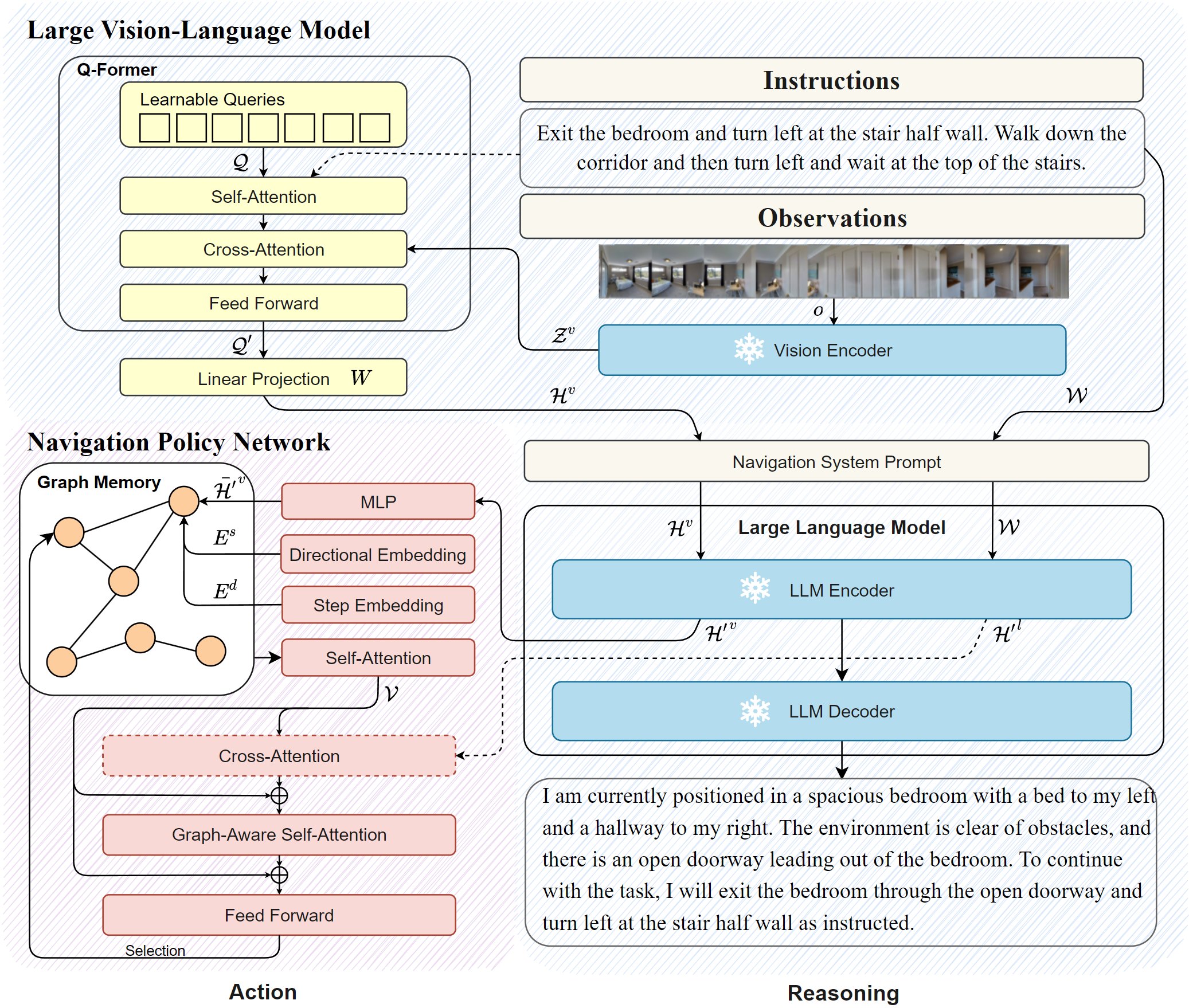Capitalizing on the remarkable advancements in Large Language Models (LLMs), there is a burgeoning initiative to harness LLMs for instruction following robotic navigation. Such a trend underscores the potential of LLMs to generalize navigational reasoning and diverse language understanding. However, a significant discrepancy in agent performance is observed when integrating LLMs in the Vision-and-Language navigation (VLN) tasks compared to previous downstream specialist models. Furthermore, the inherent capacity of language to interpret and facilitate communication in agent interactions is often underutilized in these integrations. In this work, we strive to bridge the divide between VLN-specialized models and LLM-based navigation paradigms, while maintaining the interpretative prowess of LLMs in generating linguistic navigational reasoning. By aligning visual content in a frozen LLM, we encompass visual observation comprehension for LLMs and exploit a way to incorporate LLMs and navigation policy networks for effective action predictions and navigational reasoning. We demonstrate the data efficiency of the proposed methods and eliminate the gap between LM-based agents and state-of-the-art VLN specialists.
- Release 🎇NavGPT-2 policy finetuning code.
- Release visual instruction tuning code.
- Release navigational reasoning data.
- Release pretrained models weights.
- Release data preparation scripts.
Two ways are provided to set up the environment: Conda and Docker, can choose either one according to your preference.
- Create a conda environment and install all dependencies:
conda create --name NavGPT2 python=3.8
conda activate NavGPT2
pip install -r requirements.txt-
Install Matterport3D simulator follow instructions here.
You could find some hints from the provided Dockerfile of how to build the simulator in conda environment :) .
A Dockerfile is provided to build the environment with all dependencies installed. You can either pull the Docker image directly from Docker Hub or build it yourself using the provided Dockerfile.
- OPTION 1: Pull the Docker image from Docker Hub:
docker pull gengzezhou/mattersim-torch2.2.0cu118:v2
docker run -it gengzezhou/mattersim-torch2.2.0cu118:v2 /bin/bashStart a container and run the following lines to make sure you activate the environment:
source /root/miniconda3/etc/profile.d/conda.s
conda activate
export PYTHONPATH=/root/Matterport3DSimulator/build- OPTION 2: Build the Docker image from the provided Dockerfile:
docker build -t navgpt2:v1 .
docker run -it navgpt2:v1 /bin/bashDownload the required data:
python download.py --dataThis script will automatically download the following datasets:
-
R2R Data and Pre-computed Image Features (EVA-CLIP-g):
Source: Huggingface Datasets: ZGZzz/NavGPT-R2R
Destination:
datasets -
Instruction Tuning Data for NavGPT-2:
Source: Huggingface Datasets: ZGZzz/NavGPT-Instruct
Destination:
datasets/NavGPT-Instruct
Unzip the downloaded R2R data:
cd datasets
cat R2R.zip.* > R2R.zip
unzip R2R.zipThe data directory is structed as follows:
datasets
├── NavGPT-Instruct
│ ├── NavGPT_train_v1.json
│ └── NavGPT_val_v1.json
└── R2R
├── annotations
├── connectivities
└── features
└── MP3D_eva_clip_g_can.lmdb
Alternatively, you can specify the datasets to download by providing the --dataset argument to the script. For example, to download only the R2R data:
python download.py \
--data \
--dataset 'r2r'Download the pretrained models:
python download.py --checkpointsThis script will automatically download the following pretrained models:
| Model | Log | R2R unseen | R2R test | ||||||||
|---|---|---|---|---|---|---|---|---|---|---|---|
| TL | NE | OSR | SR | SPL | TL | NE | OSR | SR | SPL | ||
| NavGPT2-FlanT5-XL | here | 12.81 | 3.33 | 78.50 | 69.89 | 58.86 | 13.51 | 3.39 | 77.38 | 70.76 | 59.60 |
| NavGPT2-FlanT5-XXL | here | 14.04 | 2.98 | 83.91 | 73.82 | 61.06 | 14.74 | 3.33 | 80.30 | 71.84 | 60.28 |
The checkpoints include the following files:
-
Pretrained NavGPT-2 Q-former weights, will be put in the
map_nav_src/models/lavis/outputdirectory. -
Finetuned NavGPT-2 policy weights, will be put in the
datasets/R2R/trained_modelsdirectory.
Alternatively, you can specify the models to download by providing the --model argument to the script. For example, to download only the NavGPT2-FlanT5-XL weights:
python download.py \
--checkpoints \
--model 'xl'You could skip this stage and directly use the provided pretrained NavGPT-2 Q-former for policy finetuning.
Set the cache directory in defaults.yaml as the absolute path to NavGPT-2.
Perform visual instruction tuning of NavGPT-2 Q-former with FlanT5-xl:
cd map_nav_src/models
bash run_script/train_NavGPT_xl.shAlternatively, you can switch the LLM to FlanT5-xxl, Vicuna-7B, or Vicuna-13B by running the following scripts:
bash run_script/train_NavGPT_xxl.sh
bash run_script/train_NavGPT_7B.sh
bash run_script/train_NavGPT_13B.shThe training logs and checkpoints will be saved in the models/lavis/output directory.
Evaluate the trained NavGPT-2 policy with FlanT5-xl on the R2R dataset:
cd map_nav_src
bash scripts/val_r2r_xl.shFinetune and evaluate the NavGPT-2 policy with FlanT5-xl on the R2R dataset:
cd map_nav_src
bash scripts/run_r2r_xl.shThis script will use the released instruction-tuned NavGPT-2 Q-former as initialization. The results will be saved in the map_nav_src/datasets/R2R/exprs_map/finetune directory.
Replace the --qformer_ckpt_path argument in the run_r2r_xl.sh script with the path to the desired NavGPT-2 Q-former checkpoint to finetune the policy with a different model.
Alternatively, you can switch the LLM to FlanT5-xxl, Vicuna-7B, or Vicuna-13B by running the following scripts:
bash scripts/run_r2r_xxl.sh
bash scripts/run_r2r_vicuna7b.sh
bash scripts/run_r2r_vicuna13b.shWe extend our gratitude to MatterPort 3D for their valuable contributions to the open-source platform and community.
We also acknowledge the significant benefits of using DUET and InstructBLIP in this work. Our thanks go out to the creators of these outstanding projects.
If you find this work helpful, please consider citing:
@article{zhou2024navgpt2,
title={NavGPT-2: Unleashing Navigational Reasoning Capability for Large Vision-Language Models},
author={Zhou, Gengze and Hong, Yicong and Wang, Zun and Wang, Xin Eric and Wu, Qi},
journal={arXiv preprint arXiv:2407.12366},
year={2024}
}



